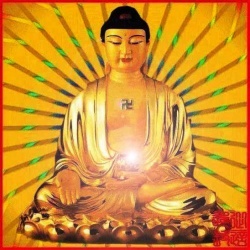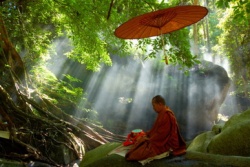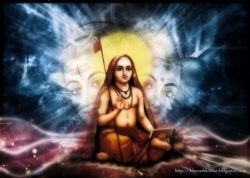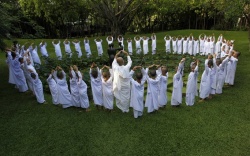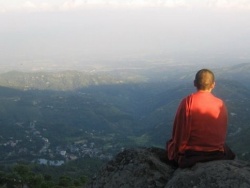Difference between revisions of "Monastic vows"
| Line 1: | Line 1: | ||
| + | <nomobile>{{DisplayImages|4077|4041|2301|2309|3665|1553|2927|1911|1814|2321}}</nomobile> | ||
| Line 4: | Line 5: | ||
| − | Becoming a | + | == [[Becoming a monk]] or [[nun]]== |
| − | Inspired by the [[understanding]] of the [[Four Noble Truths]] and the contemplation of the [[Four Thoughts]] that turn the [[mind]] towards the [[teachings of the Buddha]] ("[[Dharma]]"), practitioners [[feel]] a great yearning to {{Wiki|renounce}} [[cyclic existence]] ("[[samsara]]") and practice uninterruptedly in order to [[attain enlightenment]] as soon as possible | + | Inspired by the [[understanding]] of the [[Four Noble Truths]] and the contemplation of the [[Four Thoughts]] that turn the [[mind]] towards the [[teachings of the Buddha]] ("[[Dharma]]"), practitioners [[feel]] a great yearning to {{Wiki|renounce}} [[cyclic existence]] ("[[samsara]]") and practice uninterruptedly in order to [[attain enlightenment]] as soon as possible. |
| + | The [[renunciation]] of [[samsara]] and deep practice are [[essential]] for all who truly wish to [[experience]] the [[fruition]] of the [[path]]. | ||
| − | + | This means making an [[effort]] to abandon unnecessary and [[worldly]] [[activities]] as much as possible and focus on the [[Dharma]] exclusively. If we are unable to give up our [[attachment]] to [[samsara]], we can never be truly free from it. | |
| + | Some are able to integrate their practice with a householder's [[life]]. Others choose to take the [[vows]] of a [[monk]] or [[nun]]. | ||
| − | + | All practitioners, whether lay or [[monastic]] must truly and irreversibly turn their [[mind]] towards the [[Dharma]] and away from [[samsara]] if they wish to [[attain enlightenment]]. | |
| + | == [[Why Take Vows]]? == | ||
| − | |||
| + | The main [[reason]] [[people]] take [[monastic ordination]] is because they wish to [[benefit]] all [[sentient beings]] without exception through the study of the [[Dharma]] and through [[prayer]] and [[meditation practice]]. | ||
| − | + | As a result of this wish, they [[feel]] motivated to carry through their study and practice in circumstances as free from the {{Wiki|distractions}} of daily [[life]] as possible. | |
| + | The more you study, the more you can improve your [[understanding]] of the [[Dharma]] and therefore strengthen your practice. The stronger your practice, the more you can help others connect to the [[path to liberation]]. | ||
| − | [[ | + | Moreover, within the [[monastic]] {{Wiki|environment}}, it may be possible to receive instruction more frequently than in a householder's circumstances. Because of this focus, the [[monastery]] itself can become an [[object]] of [[refuge]] for the {{Wiki|community}} it is in, creating the circumstances that help others to learn and connect with the [[Buddha's teachings]]. |
| − | |||
| + | == [[An Object of Refuge]] == | ||
| − | |||
| − | + | One of the [[three objects]] of [[refuge]] is actually the [[sangha]], as the [[Buddha]] [[taught]]. Since the time of [[Buddha]] the [[monastic]] [[sanghas]] of [[monks and nuns]] have been the primary holders of the [[Dharma]] because they receive the teachings directly from the [[teacher]]. | |
| + | It is through intensive study and practice of these teachings that [[monastics]] as well as [[yogis]] and [[lay people]] have themselves become great [[teachers]] and [[realized beings]], inspirational to others who would seek the [[liberation]] that they have achieved. | ||
| − | To take [[vows]] from a [[Palyul]] [[master]] | + | |
| + | == [[Vows]] == | ||
| + | |||
| + | |||
| + | The [[monastic]] [[path]] is not an easy [[path]]. | ||
| + | |||
| + | The [[vows]] which [[monks and nuns]] take are called the "[[Personal Liberation]]" [[vows]] which are a commitment taken by the purely-renounced [[mind]] to abstain from harming others. | ||
| + | |||
| + | Taking these [[vows]] involves [[promising]] to abandon certain [[activities]] and to uphold [[pure]] [[moral discipline]]. | ||
| + | |||
| + | [[Vows]] taken during [[ordination]] are kept for one's whole [[life]]. | ||
| + | |||
| + | If a changes one's [[mind]] after a few years it is not sufficient to just stop being a [[monk]] or [[nun]], it is necessary to formally give back the [[vows]] to another [[monastic]] who is holding his or her [[vows]] purely. | ||
| + | |||
| + | If a [[monastic]] breaks his or her [[root vows]] it [[causes]] a very [[negative karma]] which is extremely difficult to {{Wiki|purify}} in this [[life]]. | ||
| + | |||
| + | Thus, a [[person]] considering [[ordination]] should be {{Wiki|aware}} that it is a serious commitment which lasts one's whole [[life]]. It is inappropriate to take [[monastic ordination]] wishing "just to try it for a few years". | ||
| + | |||
| + | |||
| + | == How to take [[ordination]] == | ||
| + | |||
| + | |||
| + | Anyone wishing [[ordination]] must clear their [[lives]] of outstanding business, arranging their finances and clearing debts before taking [[vows]]. | ||
| + | |||
| + | In order to take [[ordination]], one must make a formal request, in [[person]], to a [[master]] who is qualified to give [[ordination]]. | ||
| + | |||
| + | The [[master]] will then assess the person's request [[including]] their sincerity and preparedness for taking on the difficult [[path]] of {{Wiki|training}} in the [[monastic]] [[tradition]]. | ||
| + | |||
| + | It is not uncommon that prospective [[monastics]] are asked to wait a few years before [[ordination]]. | ||
| + | |||
| + | This is in order to {{Wiki|protect}} [[people]] from rushing into a situation without the requisite stability. | ||
| + | |||
| + | Many [[people]] have found it beneficial to wait and maintain [[celibacy]] for at least a year before [[ordination]] in order to create the positive [[habits]] necessary to keep the [[vows]] purely once they are received. | ||
| + | |||
| + | |||
| + | == To take [[vows]] from a [[Palyul]] [[master]] == | ||
| − | - In the Eastern Hemisphere, the best way to request [[ordination]] is to request permission to travel to [[Namdroling Monastery]] to make this request in [[person]]. The [[monastery]] gives {{Wiki|novice}} and full [[ordination]] every year before the beginning of the [[shedra's]] {{Wiki|academic}} year, usually April or May. You must call the office at [[Namdroling]] to make arrangements and inquire about the schedule. International students have taken [[ordination]] at this time in the {{Wiki|past}}. Please note that permission to visit the [[monastery]] and a permit from the {{Wiki|Indian government}} is required. | + | - In the Eastern Hemisphere, the best way to request [[ordination]] is to request permission to travel to [[Namdroling Monastery]] to make this request in [[person]]. |
| + | |||
| + | The [[monastery]] gives {{Wiki|novice}} and full [[ordination]] every year before the beginning of the [[shedra's]] {{Wiki|academic}} year, usually April or May. You must call the office at [[Namdroling]] to make arrangements and inquire about the schedule. | ||
| + | |||
| + | International students have taken [[ordination]] at this time in the {{Wiki|past}}. | ||
| + | |||
| + | Please note that permission to visit the [[monastery]] and a permit from the {{Wiki|Indian government}} is required. | ||
- In the [[Western Hemisphere]], one is encouraged to attend the [[summer retreat]] in the [[Wikipedia:United States of America (USA)|United States]]. During the [[retreat]] it may be possible to request [[ordination]] from a [[Palyul]] [[master]] through a formal request. | - In the [[Western Hemisphere]], one is encouraged to attend the [[summer retreat]] in the [[Wikipedia:United States of America (USA)|United States]]. During the [[retreat]] it may be possible to request [[ordination]] from a [[Palyul]] [[master]] through a formal request. | ||
| − | Support | + | == Support == |
| + | |||
| + | |||
| + | At [[Namdroling Monastery]] in [[South India]] it is possible, with the permission of the governing board, for [[monastics]] from outside [[India]] to receive the same support as the resident [[Tibetan]] and [[Himalayan]] [[monks and nuns]]. | ||
| + | |||
| + | Although very basic [[food]] and accommodation is provided free of charge, both [[Tibetans]] and international students generally choose to seek a sponsor to provide additional income. [[Conditions]] at the [[monastery]] can be very rustic. | ||
| + | |||
| + | Expenses for international students at [[Namdroling]] generally include: additional [[food]], [[medicine]], [[Dharma]] [[books]] in their native [[language]], supplies for study and practice, clothing and bedding, travel for visas and teachings in other areas, etc. | ||
| + | |||
| + | International students who are unable to find a sponsor sometimes go overseas to work for a few months and return with enough [[money]] to last a few years. More details about courses of study at [[Namdroling]] can be found here. | ||
| + | |||
| + | In the [[Western Hemisphere]], there is no formal support {{Wiki|structure}} within the [[Palyul Lineage]] for those who have taken [[monastic ordination]]. | ||
| + | |||
| + | Many [[people]] choose to work and save [[money]] which then allows them to spend extensive periods engaged in study and practice either at [[Western]] [[Dharma]] centers or in [[monasteries]] in [[India]] and [[Nepal]]. | ||
| + | |||
| + | In {{Wiki|Asian}} countries it is rarely necessary for [[monastics]] to seek employment as they are sponsored by their relatives and friends. It is said in the teachings that the lay [[person]] who sponsors a [[monastic]] with [[pure]] [[moral discipline]] also accumulates [[merit]]. | ||
| + | |||
| + | Since the [[Dharma]] and the [[monastic]] [[tradition]] are relatively new to the [[West]], the [[tradition]] of [[lay people]] sponsoring [[monastics]] has not caught on very much. | ||
| + | |||
| + | [[Western]] [[monastics]] who cannot find a sponsor and do not wish to live in [[India]] generally have no choice but to find a job. It is best to choose work that is in [[harmony]] with the [[Dharma]]. | ||
| + | Some [[people]] choose work which is directly beneficial to others such as nursing or {{Wiki|social}} work. | ||
| − | + | Jobs which allow one to stay at home or have few hours outside are also good as they allow one to focus on one's primary job as a [[monastic]] which is the study and practice of [[Dharma]]. | |
| − | + | Jobs that would [[cause]] one to bend or break one's [[vows]] are, of course, to be avoided. | |
| − | + | Further, if one is not able to wear one's [[robes]] one should attempt to wear the colors of the [[Sangha]] as much as one can, even if it is only possible to wear suits with the correct colors. | |
| − | + | Most importantly, one's commitment to {{Wiki|renounce}} [[samsara]] should be kept in [[mind]]. | |
| + | It is discouraging for [[monastics]] when they must spend the majority of their time at a job where they must engage in [[worldly]] [[activities]] and possibly even hide their [[ordination]]. | ||
| + | Staying for extended periods of time with [[worldly]] [[activities]], a [[monk]] or [[nun's]] [[monastic]] resolve may {{Wiki|decline}}, and ultimately this can lead to having to give up [[ordination]]. | ||
| + | This is not the {{Wiki|purpose}} of a [[monastic]]. | ||
| + | A [[person]] considering [[ordination]] should give serious [[thought]] to the [[conditions]] and circumstances which will be necessary for them to keep their [[ordination]] for the rest of their [[lives]] and how that [[ordination]] will be conducive to their practice and eventual [[enlightenment]] for the [[benefit]] of all [[sentient beings]] without exception. | ||
see also: [[Ordination in the Tibetan Buddhist Tradition]] | see also: [[Ordination in the Tibetan Buddhist Tradition]] | ||
| + | {{R}} | ||
| + | http://www.palyul.org/eng_about_monasticvows.htm | ||
| + | [[Category:Sangha]] | ||
| + | [[Category:Vinaya Pitaka]] | ||
| + | [[Category:Tibetan Buddhism]] | ||
Revision as of 10:11, 31 January 2016
Becoming a monk or nun
Inspired by the understanding of the Four Noble Truths and the contemplation of the Four Thoughts that turn the mind towards the teachings of the Buddha ("Dharma"), practitioners feel a great yearning to renounce cyclic existence ("samsara") and practice uninterruptedly in order to attain enlightenment as soon as possible.
The renunciation of samsara and deep practice are essential for all who truly wish to experience the fruition of the path.
This means making an effort to abandon unnecessary and worldly activities as much as possible and focus on the Dharma exclusively. If we are unable to give up our attachment to samsara, we can never be truly free from it.
Some are able to integrate their practice with a householder's life. Others choose to take the vows of a monk or nun.
All practitioners, whether lay or monastic must truly and irreversibly turn their mind towards the Dharma and away from samsara if they wish to attain enlightenment.
Why Take Vows?
The main reason people take monastic ordination is because they wish to benefit all sentient beings without exception through the study of the Dharma and through prayer and meditation practice.
As a result of this wish, they feel motivated to carry through their study and practice in circumstances as free from the distractions of daily life as possible.
The more you study, the more you can improve your understanding of the Dharma and therefore strengthen your practice. The stronger your practice, the more you can help others connect to the path to liberation.
Moreover, within the monastic environment, it may be possible to receive instruction more frequently than in a householder's circumstances. Because of this focus, the monastery itself can become an object of refuge for the community it is in, creating the circumstances that help others to learn and connect with the Buddha's teachings.
An Object of Refuge
One of the three objects of refuge is actually the sangha, as the Buddha taught. Since the time of Buddha the monastic sanghas of monks and nuns have been the primary holders of the Dharma because they receive the teachings directly from the teacher.
It is through intensive study and practice of these teachings that monastics as well as yogis and lay people have themselves become great teachers and realized beings, inspirational to others who would seek the liberation that they have achieved.
Vows
The monastic path is not an easy path.
The vows which monks and nuns take are called the "Personal Liberation" vows which are a commitment taken by the purely-renounced mind to abstain from harming others.
Taking these vows involves promising to abandon certain activities and to uphold pure moral discipline.
Vows taken during ordination are kept for one's whole life.
If a changes one's mind after a few years it is not sufficient to just stop being a monk or nun, it is necessary to formally give back the vows to another monastic who is holding his or her vows purely.
If a monastic breaks his or her root vows it causes a very negative karma which is extremely difficult to purify in this life.
Thus, a person considering ordination should be aware that it is a serious commitment which lasts one's whole life. It is inappropriate to take monastic ordination wishing "just to try it for a few years".
How to take ordination
Anyone wishing ordination must clear their lives of outstanding business, arranging their finances and clearing debts before taking vows.
In order to take ordination, one must make a formal request, in person, to a master who is qualified to give ordination.
The master will then assess the person's request including their sincerity and preparedness for taking on the difficult path of training in the monastic tradition.
It is not uncommon that prospective monastics are asked to wait a few years before ordination.
This is in order to protect people from rushing into a situation without the requisite stability.
Many people have found it beneficial to wait and maintain celibacy for at least a year before ordination in order to create the positive habits necessary to keep the vows purely once they are received.
To take vows from a Palyul master
- In the Eastern Hemisphere, the best way to request ordination is to request permission to travel to Namdroling Monastery to make this request in person.
The monastery gives novice and full ordination every year before the beginning of the shedra's academic year, usually April or May. You must call the office at Namdroling to make arrangements and inquire about the schedule.
International students have taken ordination at this time in the past.
Please note that permission to visit the monastery and a permit from the Indian government is required.
- In the Western Hemisphere, one is encouraged to attend the summer retreat in the United States. During the retreat it may be possible to request ordination from a Palyul master through a formal request.
Support
At Namdroling Monastery in South India it is possible, with the permission of the governing board, for monastics from outside India to receive the same support as the resident Tibetan and Himalayan monks and nuns.
Although very basic food and accommodation is provided free of charge, both Tibetans and international students generally choose to seek a sponsor to provide additional income. Conditions at the monastery can be very rustic.
Expenses for international students at Namdroling generally include: additional food, medicine, Dharma books in their native language, supplies for study and practice, clothing and bedding, travel for visas and teachings in other areas, etc.
International students who are unable to find a sponsor sometimes go overseas to work for a few months and return with enough money to last a few years. More details about courses of study at Namdroling can be found here.
In the Western Hemisphere, there is no formal support structure within the Palyul Lineage for those who have taken monastic ordination.
Many people choose to work and save money which then allows them to spend extensive periods engaged in study and practice either at Western Dharma centers or in monasteries in India and Nepal.
In Asian countries it is rarely necessary for monastics to seek employment as they are sponsored by their relatives and friends. It is said in the teachings that the lay person who sponsors a monastic with pure moral discipline also accumulates merit.
Since the Dharma and the monastic tradition are relatively new to the West, the tradition of lay people sponsoring monastics has not caught on very much.
Western monastics who cannot find a sponsor and do not wish to live in India generally have no choice but to find a job. It is best to choose work that is in harmony with the Dharma.
Some people choose work which is directly beneficial to others such as nursing or social work.
Jobs which allow one to stay at home or have few hours outside are also good as they allow one to focus on one's primary job as a monastic which is the study and practice of Dharma.
Jobs that would cause one to bend or break one's vows are, of course, to be avoided.
Further, if one is not able to wear one's robes one should attempt to wear the colors of the Sangha as much as one can, even if it is only possible to wear suits with the correct colors.
Most importantly, one's commitment to renounce samsara should be kept in mind.
It is discouraging for monastics when they must spend the majority of their time at a job where they must engage in worldly activities and possibly even hide their ordination.
Staying for extended periods of time with worldly activities, a monk or nun's monastic resolve may decline, and ultimately this can lead to having to give up ordination.
This is not the purpose of a monastic.
A person considering ordination should give serious thought to the conditions and circumstances which will be necessary for them to keep their ordination for the rest of their lives and how that ordination will be conducive to their practice and eventual enlightenment for the benefit of all sentient beings without exception.
see also: Ordination in the Tibetan Buddhist Tradition

